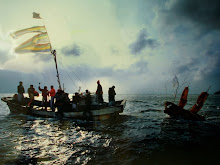So along with the class Tech Resources for Performing Arts Educators, I am engaged in starting a new Blog, in thinking of topics that I would like to engage in, and wondering if I should switch from a Blog approach to a WIKI approach in which we write to a single source. I guess I still favor individuality and personal choices, and a WIKI to some extent surrenders individual choices in favor of a group consensus, although consensus may not be accurate.
We have a diverse class, and many interests and points of view are represented. Blogs provide a platform for an individual. It is freedom of the press in its fullest glory. WIKI's are for pursuing mutual interests. Apparently the term comes from the Hawaiian "wiki wiki" that means "quick." It was used by Ward Cunningham in 1995 when he created the first Wiki. The success of Wiki's had been noted by many, the most well-known of course is Wikipedia in which print-oriented people vilify anyone who refers to it as a source for information (yet almost everyone does).
Cunningham describes the origin of the word to fit and generate a new technology:
I learned the word wiki on my first visit to Hawai'i when I was directed to the airport shuttle, called the Wiki Wiki Bus. I asked for that direction to be repeated three or four times until the airline representative took the time to define the word wiki for me. The next day I picked up a small book about Hawai'ian and learned more interesting things about the language.Language can be a persuasive force, and as I explore our class further, maybe we will need to try a Wiki, just to see what happens.
I wanted an unusual word to name for what was an unusual technology. I was not trying to duplicate any existing medium, like mail, so I didn't want a name like electronic mail (email) for my work. The community that formed around my site were willing to explore its capabilities without preconceived notions of how it should work. An example of such a notion is the "timeless now" in which "conversation" takes place. Curiously, Wikipedia aspires to be only an encyclopedia, but has inherited many of the non-encyclopedic properties of my original site. Wikipedia would not be as successful as it is now had I named WikiWikiWeb "electronic-encyclopedia". Its unique social conventions and properties would not have evolved.
Professionally I study how programmers think about the structures they create within their programs. I'm a proponent of systematic naming of computer structures based on continuously evolving metaphor. I'm inspired by the cognitive psychologist George Lakoff. My work has lead to the development of "automatic refactoring tools" that can, among other things, correct poorly chosen names in large computer programs. My work helps programmers think clearly about the universes they create. I hope that this will improve the computer experience for all users.

